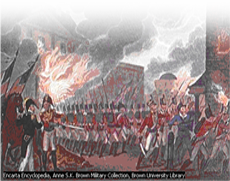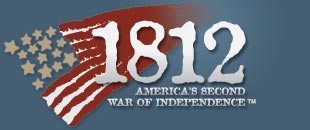 -->
-->
 -->
-->
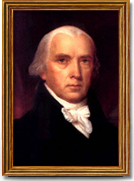
James Madison, the fourth President of the United States (1809-1817), and one of the Founding Fathers of the United States, was an American politician and political philosopher. The principal author of the U.S. Constitution, Madison is often called the "Father of the Constitution." The Bill of Rights, the first ten amendments to the Constitution, is attributed to Madison, therefore, he is also known as the "Father of the Bill of Rights." Madison, a political theorist and a leader in the First United States Congress, authored over a third of the Federalist Papers, and was the first president to have served in the United States Congress. Madison's most distinctive belief was that the new republic needed checks and balances to protect individual rights from the tyranny of the majority.
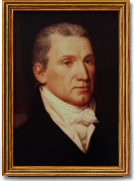
James Monroe, native son, was born in Westmoreland County, Virginia on April 28, 1758 and died July 4, 1831, Independence Day. Monroe was the fifth President of the United States and served two terms from 1817 to 1825. During the War of 1812, he served as Madison's Secretary of War. James Monroe, the last of the Founding Fathers, was also the last one from the Virginia dynasty and the Republican generation to become the President of the United States. His administration was hailed as the beginning of an "Era of Good Feelings," a period of relatively little partisan strife, and later by a painful economic depression, the Panic of 1819. During his administration, a fierce national debate ensued over the admission of the Missouri Territory, as a slave state. In foreign affairs, Monroe is most noted for his proclamation in 1823 that today bears his name, the Monroe Doctrine, which stated that the United States would not tolerate further European intervention in the Americas.
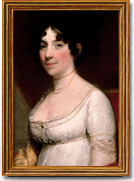
Dolley Payne Todd Madison, First Lady of the United States, was born on May 20, 1768, in the Quaker settlement of New Garden, North Carolina, where her parents, both Virginians, had moved in 1765. She married lawyer John Todd in January 1790, and from this union two sons were born. Her husband and youngest son died from yellow fever in 1793, leaving her a widow at age 25. On September 15, 1794, she married James Madison, who became the fourth President of the United States in 1808. After Madison's retirement from the U.S. House of Representatives in 1797, the family returned to Montpelier, Madison's family estate in Orange County, Virginia. However, in 1801, the family soon moved to Washington, D.C. when Madison was appointed Secretary of State by President Thomas Jefferson. During the War of 1812, Dolley Madison used her great social skills to help promote morale. When the British invaded Washington, burning the White House, the Capitol, and other federal government buildings, Dolley Madison is credited with saving Stuart's portrait of George Washington which hung in the White House, and other important government documents.
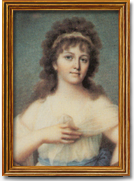
Elizabeth Kortright Monroe was born on June 30, 1768, in New York to a wealthy Loyalist family. Elizabeth Monroe, wife of James Monroe, the fifth President of the United States, was First Lady of the United States from 1817 to 1825. She accompanied her husband on his many diplomatic trips, and during his tenure as United States Minister to France, she befriended and helped secure the release of Madame La Fayette, wife of the Marquis de Lafayette who was imprisoned during the Reign of Terror and was sentenced to death by guillotine. Together with her husband, they supported and provided shelter to Thomas Paine, an American citizen in Paris, who was arrested for his opposition to the execution of Louis XVI. As First Lady, Elizabeth Monroe introduced a more formal social protocol in the White House than was accustomed in previous administrations. Her changes offended many in Washington society; however, she did not abandon them. First Lady Elizabeth Monroe was not engaged in her husband's presidency; rather, she devoted her interests and time to domestic matters.
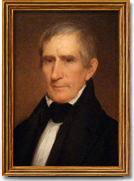
William Henry Harrison, the ninth President of the United States, was born on February 9, 1773, on Berkeley Plantation in Charles City County, Virginia. His family was one of the wealthiest and most politically prominent families in Virginia. His father, one of the original signers of the Declaration of Independence, was a three term Governor of Virginia. William Henry Harrison studied medicine in preparation to become a physician, but later in life chose a career in the military. In the War of 1812, he served as the Major General of the Kentucky militia and of the Northwest Territories. He led his forces to retake Detroit, and defeated a force of British and the Indian Confederacy in Indiana, which led by the Native American Indian Chief Tecumseh at the Battle of the Thames, where he gained the nickname, "Old Tippecanoe.". Following his military duty, William Henry Harrison became Secretary of the Northwest Territory in 1798 and served as the Northwest Territory delegate to the Virginia House of Delegates from 1799 to 1800 before being appointed Governor of the Indian Territories. After the War of 1812, he was elected to the U.S. of Representatives and the U.S. Senate. He was inaugurated as President in 1841. His inaugural address--one hour and 40 minutes, was the longest on record and was delivered in the cold during the month of March. Exposed to the rain and bitter cold, he became ill and died on April 4, 1841, having served only 32 days in office.
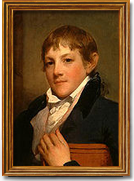
John Randolph, the son of a rich Virginia tobacco planter, was born on June 2, 1773 in Hopewell, Virginia, formerly Cawsons, Virginia. As a member of one of the prominent First Families of Virginia, he was a planter and represented Virginia in the U.S. House of Representatives and in the U. S. Senate. He also served as Minister to Russia by President Andrew Jackson. After serving as President Thomas Jefferson's spokesman in the House of Representatives, he parted with the President and became a leader of the "Old Republican," a faction of the Democratic-Republican Party which espoused a very limited role of the federal government. John Randolph believed that the states had the authority to determine the constitutionality of federal laws and policies and could refuse to enforce laws deemed unconstitutional. He served as the jury foreman of the grand jury in Richmond that indicted Aaron Burr and others for treason. He was a member of the 1829 Virginia Constitutional Convention. John Randolph was defeated for re-election in 1812 due to his impassioned opposition of the War of 1812.
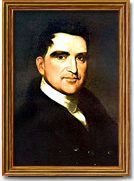
James Barbour, Governor of Virginia, was born on June 10, 1775, near Gordonsville in Orange County, Virginia. Governor Barbour, an attorney, began his public service career as deputy sheriff of Orange County. He was a member of the Virginia House of Delegates from 1796 to 1812, and served as speaker from 1809 to 1812. He patroned the legislation creating the Virginia Literary Fund which provides public funding for public education in the Commonwealth. In 1812, he was elected Governor of Virginia and served from 1812 to 1814. He was the first Governor to reside in the current Virginia Governor's Mansion. A renowned statesman and orator, Governor Barbour ran as an Anti-Democrat and State Rights candidate and was elected to the United States Senate in 1814 for the term commencing March 4, 1815; served as President pro tempore of the Senate during the 15th and 16th Sessions of Congress; was appointed Secretary of War by President John Quincy Adams; was named United States Minister to England from May 26, 1828, to September 23, 1829; and served as chairman of the Whig National Convention in 1839; was the founder of the Orange Humane Society, established for the advancement of education. He died in Barboursville in Orange County, Virginia on June 7, 1842.
